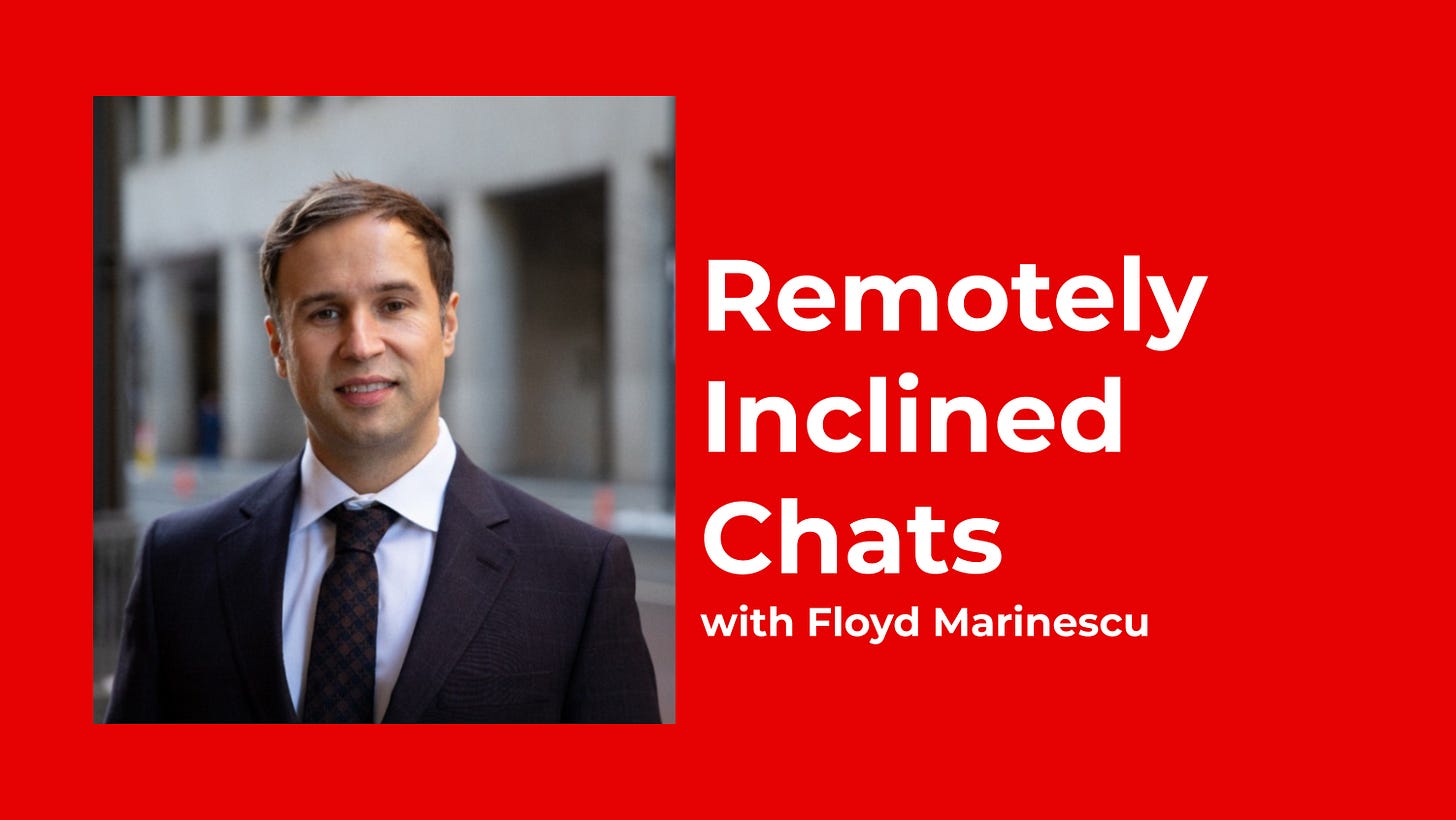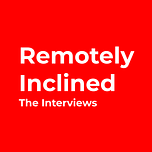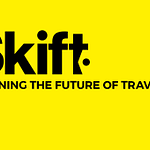Hi,
Welcome to Remotely Inclined, a newsletter about remote work and remote entrepreneurship. If you’d like to sign up, you can do so here. Want to share your feedback? Take this short survey. Or just read on…
Floyd Marinescu has never worked in an office. He started his career remotely working for an American company while in undergrad at the University of Waterloo, and he started his business C4 Media in 2005 completely remotely.
Looking back on his 15+ years of remote entrepreneurship, Floyd learned a lot about how to structure remote businesses and how to overcome the ongoing challenge of being creative when you aren’t in the same room together. He’s also an advocate for Universal Basic Income (UBI), something he believes will foster much more entrepreneurship in the world and severely reduce poverty.
Creative ideation process for remote teams
If you’re doing the creative ideation process remotely, Floyd says there are some tradeoffs.
Instead of lengthy meetings, have shorter meetings that are more frequent. While people can spend a whole day together in-person, Floyd noticed it’s very difficult to have any video chat lasting more than 2 hours.
In between meetings, individuals have ‘homework’ to brainstorm on their own, adding their ideas in writing to a central collaboration document.
The tradeoff is that this can slow down the innovation and ideation process, but you can speed it up by having multiple meetings in the same day. In that case, the tradeoff is losing some productivity in the day’s other tasks.
Building culture
Building culture is critical not just for team connection but also to reduce communication errors and challenges.
At Floyd’s company C4 Media, a big part of their culture is communications triage. Employees know that Slack is for project management, email is for non-critical but still essential work items, and Workplace by Facebook is the company’s ‘virtual watercooler’ to share fun stories, ideas, memes, and other social elements of the organization. This process ensures that employees are not greeted with multiple Slack notifications and forced to check every item to see which is important or not.
C4 Media also has transparent dashboards for every key company metric and each metric either has its own regular meeting or is brought up in a larger setting. This, said Floyd, makes sure everyone can see exactly what the company is working toward and has the opportunity to clarify and ask questions on a regular basis.
Before each meeting, employees do a one-word-emotion check in, where they say how they are feeling in one word (e.g. happy, sad, stressed, etc.) and can choose to tell a story about it if they’d like. This grounds every meeting, said Floyd, and ensures that everyone in the company gets to know a bit more about their coworkers as people.
The case for UBI
A strong supporter for universal basic income (UBI), Floyd sees it as a necessary next step in world economies.
Economic growth is being driven by capital, not labor, meaning more people are being pushed into low-income jobs.
This is bad for the economy, as it has downstream effects -- when people can’t provide for themselves, they are more likely to be exploited, cost more to the state for healthcare, etc.
UBI is a minimum floor that props everyone up (and would be taxed as income, so high earners wouldn’t get it in the end) so that everyone has a basic standard of living -- which empowers them to take risks, start businesses, take part in civic duties, organize against corruption, and generally be a more active member of society.
The final word
“I can see more businesses starting remote from the very beginning… There will be a lot more remote work and that’ll overall be very good for the economy. It can bring us up into a much better world.”
Readers like you make this newsletter possible. Subscribe for regular insights and stories about remote work.
Remotely Inclined Chats with Floyd Marinescu
Transcript edited for brevity and clarity.
Stefan: Welcome, Floyd! Can you kick it off by sharing what you’re working on and a bit about you?
Floyd: Yeah. C4 Media runs events for software engineers and we have a news website called InfoQ.com, which serves the latest news to over a million software engineers.
I have a computer science degree from the University of Waterloo. I’ve actually worked remote my whole life. I’ve never worked in an office except as a student intern, and I’m 42 years of age now. Working remotely is natural to me. In some ways, one of the silver linings behind the pandemic is that suddenly the whole world learned to use technology properly - and I think it’s going to create a rapid move towards remote work.
How did you start C4 Media, and can you talk through the decision to found it remote from day one?
It all started when I was in second year of university. I networked my way into a small startup in the US that was doing training. The founder went remote because it was cheap - simple as that. And as an American company, hiring me as a Canadian was also pretty cheap. For me, it was the chance of a lifetime.
So for the first five years of my career, I was remote from day one. It became natural to me. And when that business got acquired, I left and started my business remote from day one.
When you’re remote, you could hire anywhere. My co-founder was in California. My other co-founder was in Romania. And the first hire after the co-founders were recent graduates living in Beijing. We were hiring for best fit and best value. This is a new normal people don’t really think about - our transition to remote work is going to hyper-globalize the world economy. Previously, you thought of globalization in terms of industrial machinery. But it’s already been globalized in terms of labor with sites like Upwork. But now it’s even more globalized as companies can be distributed around the world.
I worked with my co-founder in California in the previous job, we thought we would do this new thing together. And software outsourcing was big and common in the early 2000s. I thought if I’m going to build a dev team, then I’m going to hire in Eastern Europe. Since my background is Romanian, I thought why not hire there.
Currently, just before the pandemic, C4 Media has 50 staff across 11 countries. Someone on zoom is someone on zoom no matter where they live.
How do you manage working across timezones?
It’s a good best practice to have an established set of core working hours. I think we did 10:30 am to 2 pm EST, and you had to be available for meetings during that time. Outside of that time, it could be timezone specific.
People say that execution work is easy to make remote, but collaboration is hard. Have you found this at C4 Media?
You’ve touched upon what I think is the only area where remote work is inferior to in-person work -- creative discovery work.
Something interesting for me is that we had a lot of repetitive excellence. Getting better at the same thing. Running an online news site with an advertising business is like maintaining a slew of rivers that have to flow consistently and you have to improve the speed bit by bit. The execution work was all done online, so you didn’t need to be in-person. Same with running events - it’s easy to plan remotely because people just fly in for events and then leave.
But the Achilles heel of remote work is the creative ideation process - that is very painful to do remotely.
When you’re in an environment of frequent change, it’s difficult to do remotely because it’s just better if you’re in the same room and have the luxury of frequent interruptions to ideate on things. There’s no human barrier to Slacking someone, asking for a call, which for some reason there is when you are remote.
Despite our best attempts over 20 years of doing this, it’s painful to be on a zoom call for more than two hours. It just doesn’t work very well. Versus the same people in a room could easily make it work and not feel so drained.
If you’re doing the creative ideation process remotely, there are some tradeoffs.
It works best to have shorter meetings that are more frequent and regularly scheduled to occur.
In between meetings, people should have creative homework - they have to think through things on their own.
Then people have to add their ideas to a core ideas document in writing, and your ideas have the same weight as anyone else’s ideas when they’re written down. It’s an introvert’s paradise, I think.
But in this process you spread the ideation process out over a period of time. You could end up with a better product, but it moves more slowly than if you’re all in a room blurting things out for a day to try to get to an outcome quickly. But in this case you have an environment that favors extroverts.
What challenges have you overcome in your remote career / what challenges should others pay attention to?
Feelings of isolation
We’ve addressed these in a number of ways. It’s important to have a social network, so we use Workplace by Facebook and Yammer before that.
It’s important to have it distinct from Slack or tools like that because Slack is for project coordination and Workplace is for the watercooler, sharing ideas, sharing updates, and sharing things that aren’t actionable or task oriented. Things like celebrations, birthday wishes, or news of the day. You don’t want that stuff in Slack because it’s very distracting.
Team connection
Another important thing for remote cultures is making time for personal connection on your calls. So any meeting we have, we’ll start with a personal check-in. Everyone can share something personal or work related that’s meaningful to them.
We follow a method called the Core Protocols for High Performing Teams. We’ll check in with one word emotions, like feeling glad, sad, afraid, mad, or something else. It’s a chance to check your emotions at the door and feel connected to others. Everyone can tell a story if they want, but it’s not required.
Dashboards and transparency
And generally having a core value of transparency. The one word emotion check-ins are a kind of emotional transparency, but you should also have dashboards that reflect all the various objectives of the company and try to predict the sort of questions people might have so you can reduce anxiety. But a dashboard is only as useful as your meeting rhythms to review the dashboards. If you do that, people gain situational awareness about what’s going on in the company - and that’s a good thing.
Communications triage
Another thing I’ve always scared about that no one else has really talked about much is reducing communication stress through the concept of communications triage. So at C4 Media, we insist that Slack is for project coordination - don’t put anything trivial or social in there, use Workplace for that.
So if you start your day, you know if you’re tagged in a Slack channel, that’s something urgent. Then your next triage is to check any highlighted channels you aren’t tagged in, which are obviously less urgent because nobody tagged you. Then the third is to check your email because it tends to be a mix - train people to not send email if they expect a response within 24 hours. You should be using Slack if you expect a quick response.
So that way Slack is a triage tool and email is more of an alignment tool - and that should be understood on both sides. Then you check Workplace for the social network and ambience of the company.
This way it cuts down on stress and people don’t feel stressed when they open Slack and see 50 highlighted channels and you can’t tell what’s important or what’s not.
Shifting gears a bit, you are an advocate for Universal Basic Income (UBI). Can you explain how you came to support that?
I fell in love with the concept on a personal basis. I grew up in a house of domestic violence. If my mom had money outside of the family unit, she would have more freedom, more power, and more agency to make the right choices for herself. She also probably would have gotten more respect because a lot of power dynamics exist because there are vulnerable people to be exploited.
But when people can’t be exploited, those power dynamics shift. That’s something I like to remind libertarians -- if people have money for basic needs, they are empowered against the government, not the other way around. They can call the shots. They have time to protest or to get involved in civic actions and civic duties.
As a technologist, you can see the trend lines. When you see the share of income going to the bottom half of the country continually in decline for decades and the income going to the top 1 percent continually increase, we’re going beyond what you could call capitalism. And soon we’ll be at a point of feudalism that perhaps resembles the income distribution in pre-Revolution France. How is that sustainable?
Then you put that aside and look at other economic trend lines, where you see the share of income going to labor declining and the share of income going to capital increasing.
So human work is being devalued, although in an inconsistent manner. It has been common in almost every industrial revolution that we’ve seen a polarization where some segment of society has the right skills and really prospers, while everyone else starts to experience wage decline, wage suppression, and wages that don’t keep up with the standard of living and costs of living.
At the same time we’re facing a situation where modern computing and robotics for 40 years has been causing a decline in demand for wage labor, which you can see in lack of income growth. So income decoupled from productivity in the early 1970s.
Some economists who study automation are now concluding that we are not creating new tasks for humans as quickly as we used to. And that’s why we’re seeing a decline in wage labor. We’re creating more low income jobs than high income jobs.
That’s not a decent life. Every generation should be better off than the previous one. And UBI is frankly how we get there, because it recognizes the changing relationship between capital, work, and technology to benefit everyone. If everyone can get a dividend off our technological progress, everyone can prosper.
So UBI is like a strong welfare state?
Let me distinguish between the two key concepts of basic income.
A minimum income guarantee replaces social assistance systems. Then there’s UBI, which is a dividend - the same amount to everyone.
An income guarantee generally tapers off as your earned income approaches median wages. It fixes poverty by establishing a floor. And it’s what’s in most government proposals.
A UBI doesn’t fix poverty, but it fixes capitalism. UBI is how we share in the gains from technology, implementing dividends from our economic productivity and our growth for the prosperity of everyone.
But the problem is that no one can really wrap their heads around the radical tax reform you’d need to give everyone in the country $2,000 per month, for instance, as opposed to an income guarantee which you can think of in a more incremental manner.
With minimum income, or social assistance, you can be caught in the Welfare Trap, as it’s referred to in the United States. You could go back to work, but you effectively lose your benefit. With UBI, it changes the incentives. A lot of people want to go to work - nobody wants to be dependent. That’s why UBI could be superior to a social assistance system that doesn’t pay out enough for those who are able to work. For those who are unable to work, it’s not humane to be paying poverty levels of support and pretending you’re doing something to help people.
We’re working on a proposal that blends the two that includes both UBI and minimum income. So you have a floor that eliminates poverty and supplements the incomes of the bottom 50% of the country who have suffered most from technological wage stagnation, but you also have a smaller dividend that gives a raise to the middle class and people in the sixth and seventh income deciles, who could certain use a raise as well.
Thank you. Considering the potential for UBI and remote work technology, what is your prediction for the future of remote work?
I believe we’re going to see a rapid move towards remote work - or at least flexible work environments.
IBM did this 15 years ago when they built a generic office. Desks were not assigned to anyone and you would go in for meetings, not work. I see more companies doing that.
I can also see a lot of startups just starting remote from the very beginning. Why wouldn’t they, now that everyone understands how easy it is?
And I can see a lot of people demanding to only work in remote companies going forward, which is wonderful. It could end up being an economic stimulus if people with mid-range or high incomes could move to small towns and help out economies there, work remotely, and have a better lifestyle. When people are there for lifestyle reasons, there would be better retention. It was great for both sides. I can see those types of arrangements increasing a lot.
There will be a lot more remote work and that’ll overall be very good for the economy. It can bring us up into a much better world.
Amazing, thank you for your insights!
You can learn more about UBI Works on Twitter.












